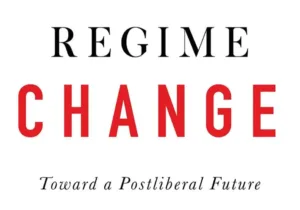Last night at the Catholic University of America, two thoughtful conservatives engaged in another round of a debate on the nature of conservativism and the goals of government. The debate’s first round began earlier this summer in a piece in First Things by the first interlocutor, the Roman Catholic Sohrab Ahmari. He argued that Christians needed to stop being so nice and to fight the “culture war” with the aim of “defeating the enemy and enjoying the spoils in the form of a public square re-ordered to the common good and ultimately the Highest Good.”
Isn’t that theocracy, asked Ahmari’s critics. “While the federal government should seek the common good, its first responsibility is to secure the liberty of its citizens,” said the Presbyterian David French in National Review, who was the foil for Ahmari’s piece and last night’s second interlocutor. He and others argued that we cannot impose a vision of the good on people, which amounts to religious imposition. Instead, we must content ourselves with just and fair rules of play, ones that treat everyone equally. Procedural liberalism, as this is called, might sometimes yield outcomes we don’t like. But it keeps everyone at the table. Our job is to work harder at persuading, so that we get more outcomes we do like.
Last night’s debate essentially rehashed the conversation from earlier in the summer, but it also managed to get into more specific problem areas, such as questions over drag queen story hour at public libraries. What’s interesting to me is
1. A Christian approach to engaging the culture war specifically, or government generally, requires two distinct conversations.
First, we need a private hallway conversation for just us Christians, where we look to the Bible for our basic principles of government and justice. Only then should we enter the negotiating room for a second, more pragmatic conversation with the whole public, where we employ common-ground arguments with people who don’t share our view of special revelation. By having one conversation after the other, politically thoughtful Christians can be principled pragmatists. The first conversation is for determining our firm-gripped biblical principles. The second is for persuading with loose-gripped pragmatic wisdom.
For instance, the Bible teaches that God created all people in his own image, that he’s given us dominion, and that therefore we are equals. From these reasons, I’m willing to say that the Bible backs up John Locke when he said that Adam and Eve possessed an “executive authority” over themselves and everything in their dominion; or that Jefferson’s phrase “the right to life, liberty, and pursuit of happiness” is a reasonable interpretation of these biblical truths. Based on my understanding of the relationship between old covenant and new, furthermore, I would strenuously deny the government’s ability or authority to coerce worship.
These are the sorts of biblical affirmations we can make in conversation one. And classical liberalism, it turns out, overlaps at crucial points. It’s almost as if its early proponents like Locke and Jefferson grew up in Sunday School, even if they later rejected particular doctrines. So I’m not surprised that Christians for centuries have felt like they have a friend in liberalism with whom to strike a bargain.
Turning to conversation two, then, I can quickly affirm the wisdom of liberal institutions like democratic voting mechanisms, separation of powers, written constitutions, bills of rights, judicial review, and so forth. I don’t hold these institutions with as firm of a grip as, say, Christ’s resurrection. Democratic elections are not in the Bible. And even the authors of The Federalist Papers well understood that the mechanism of popular sovereignty or majority rule could lead to oppression and so needed to be balanced out by other mechanisms. Abraham Lincoln, too, believed there was no moral right to expand slavery
Again, private hallway conversation one among Bible-believers provides us universally true biblical principles. Public meeting conversation two then requires us to exercise wisdom both in persuading people who don’t share our biblical starting point and in determining how to apply those principles from place to place.
Yet notice what I’m also doing in recounting these two conversations. I’m distinguishing between liberal theory and liberal institutions, and I’m refusing to build my argument for liberal institutions on liberal theory. I’m beginning with biblical principles which may or may not overlap with liberal theory (first conversation), and then I’m recommending liberal institutions as wise, even ingenious, applications of those principles (second conversation).
The trouble with liberal theory, whether in its classical or contemporary forms, is that it insists we skip the first conversation. That’s how Enlightenment thinking works. It asserts, “Never mind your Bible or any of your sectarian
Not only that, we know that John Locke believed Adam and Eve were created in God’s image. And Thomas Jefferson said he trembled for his country when he reflected that “God is just.” These biblical ideas, apparently, are at least compatible with liberalism. That’s also good.
Yet don’t be fooled. Those principles we all agreed upon like “equality,” “freedom,” and “rights” aren’t as reliable as we think. I dare say, they’ve become Trojan Horses—statues that look good on the outside, but which hide another army’s soldiers on the inside. We place one statue outside the capitol building with a sign reading “equality,” but does that include “marriage equality”? Or “rights,” but does that include the “right to death with dignity”? Or freedom, but does that include the “freedom to abort”? Well, it depends, because hiding inside those statues are different gods, each with their own definitions of justice.
Or open up and read the court opinions that talk about “human dignity.” Yet don’t assume those words mean what you think they mean. You, John Locke, and I might think in our hearts, “Ah, yes, we possess dignity because we’re created in God’s image.” But that idea cannot be written into the opinion or the Constitution behind it, because that’s not a shared moral term. Rather, human dignity has become a free-floating idea, unmoored, waiting to be defined however one pleases. If someone decides dignity means the right to define our own gender, or race, or concept of existence and the sweet mystery of life, there is no other publicly allowable moral language to restrain it. We can try to outvote such renderings, but we have no moral language left for disputing them, at least if we’re abiding by liberal theory’s terms.
To some extent, all this is inevitable. It’s realpolitik. The public square is pluralistic, and we cannot force people (and don’t want to force people) to see things from our biblical perspective. Sitting down at the bargaining table, we cannot choose the cards other players are holding. We call that religious liberty.
But let’s make sure we’re not being hoodwinked either. We need to call liberal theory’s bluff and insist on a first conversation where we determine our own principles. The public square is not neutral and god-free. We all have gods hiding inside our definitions of those shared terms, and we’re all trying to win the vote for the sake of our gods. That’s inevitable. Senator Dianne Feinstein can accuse a federal court nominee of being susceptible to making decisions in light of her religious “dogma,” but has Feinstein actually fooled herself into thinking her own dogma doesn’t drive her?
Furthermore, realize that liberalism’s moral landscape is not static. It disciples. Public values shape private ones, particularly as centuries worth of high school civics lessons, Fourth of July speeches in the town square, and even blockbuster movies teach that freedom is the main thing for which we should be willing to die. Other values will shrivel unless fed by other means. Patrick Henry’s “Give me liberty or give me death” fades into the pro-choicer’s “Give me liberty even it means my baby’s death.”
Which brings me back to my opening point. Before we sit down at liberalism’s table, let’s make sure we have the hallway conversation amongst ourselves—the meeting before the meeting where we look at our Bibles and ask it to set our goals (see the second point below). If we skip that, we’ll give away more than we realize. That’s why I get nervous when I hear fellow-Christian French say the primary purpose of government is to secure the liberty of its citizens. I want to say to him, “David, Bible-man to Bible-man, I don’t think that’s right. That sounds like liberal theory talking. And if you’re not careful, we’ll give away more than we mean to, cede more territory than we should, and, most crucially, lose track of our biblical mandate and let ourselves be subverted by worldly philosophy.”
Now, maybe French and the louder Christian defenders of liberalism are just playing the pragmatic game in this pluralistic public square, too, which would make me feel a little more comfortable. By analogy, I don’t mind Christians treating membership in a political party as a pragmatic instrument for getting stuff done, keeping only a loose-grip on it. I get worried when they begin to treat that party membership as an identity—with a firm-grip. That’s idolatrous. Likewise, I’m okay if you put one foot into liberalism; just don’t put two. If liberalism is a friend, it’s a fair-weather friend. Parties and ideologies both can make for useful instruments, but they’re awful identities.
All this might make more sense if we back up more decidedly into the first conversation.
2. The primary purpose of government is to secure justice, not liberty.
According to the Bible, justice should be our primary concern. Everything else is secondary. Liberty, rights, and equality are crucial, but they’re not self-defining. We’re to pursue a just liberty, a just rights,
The government’s primary interest
- “So David reigned over all Israel. And David administered justice and equity [righteousness] to all his people” (2 Sam 8:15).
- Israel “stood in awe of the king, because they perceived that the wisdom of God was in him to do justice” (1 Kings 3:28).
- “Because the Lord loved Israel forever, he has made you king, that you may execute justice and righteousness” (1 Kings 10:9).
- “By
justice a king builds up the land” (Prov. 29:4).
To be sure, governments should concern themselves with liberty, equality, rights, peace, and order, but those concepts are not unrestricted or free-floating. They must be bound in by justice, and justice as grounded in
Christians defending liberalism are often quick to say, “Of course, we don’t mean freedom with no limits or backstop.” Exactly. Something (or someone) must provide a backstop. And what’s that? It’s our view of justice, which in turn relies upon our God or god.
So if we skip the first conversation and walk straight into the second conversation, the public meeting, and say, “Securing liberty is our first responsibility,” our non-Bible believing friends will all say, “Great!” and then define liberty exactly as their own gods please and in ways that we find positively unjust, assuming they can get a majority of voters or Supreme Court justices on their side.
Doesn’t that mean we simply need to work harder at winning votes and Supreme Court cases? Well, maybe. The trouble here is, we might not all agree on which candidates, and which policies, and which court nominations are best. And the Bible very much means to leave many such matters in the domain of Christian freedom. What should unite all Christians or Bible-believers in the hallway is that our goal is to seek justice. Not only that, the Bible gives us a pretty good idea of what kind of justice governments should pursue (see the third point below).
Mind you, inside the public bargaining room, the advocates of procedural liberalism will tell us that none of us possesses the right to define justice substantially for one another. They claim we can only hope for a “thin” version of justice, one that’s a property of following an agreed-upon set of procedures.
Yet recall what I already said: that’s a ruse. Everyone is inside the public square fighting for their view of justice, which in turn comes from their gods. And someone’s god and its view of justice will prevail and impose itself through law. That’s what laws do. Laws impose morality. We might forget that fact when our views of God and justice broadly converge, as it did 250 years ago, at least for Whites. But place yourself inside a society with widely divergent gods, and you’ll feel it. In an unvirtuous society (by the Bible’s standards), the liberal ruse is a formula for a series of substantively unjust outcomes. George Washington and John Adams warned us of that.
Again, I’m not saying this can be helped. Our society is pluralistic. That’s realpolitik. I’m simply saying, be wise to the real game afoot. And make sure we as Christians know what justice thickly or substantively-speaking is. There is not some other brand of justice out there that’s opposed to God’s definition of justice that we would still call just. In scripture, there is the justice of God and the justice of other gods. Nothing more. His view of justice should always be our goal.
Does all this mean I’m on Sohrab Ahmari’s side? Not quite.
3. The government’s biblical obligation to seek justice depends upon a narrow protectionist view of justice, not a broad perfectionist view that orders all of society according to the Highest Good.
The demands of “justice,” when we use that word with little context, are actually pretty vague. To define the word from scripture, doing justice is rendering judgment. Yet rendering judgment requires a standard, and that standard will change from institutional context to context. For instance, justice means one thing in my marriage, another in my mortgage, another in my job. In every case, ascertaining what justice requires means attending to the “fine print” of whatever agreement forms the relationships, whether a marriage covenant or a mortgage contract.
Turning to scripture, then, we specifically
What’s more, God established various institutions to uphold and regulate those different covenants. The institutions of family and government regulate elements of the common covenants, while institutions like the Sabbath or the church regulate their respective special covenants.
What Christians and non-Christians alike rightly fear is the idea of imposing the standards of the special covenants upon all people through the common-covenant institution of government. That’s covenantal confusion. After all, the special covenants
Still, God did establish governments to establish justice. The GDP-sized question is, justice by what measure or standard? You find the answer in one crucial proviso of the Noahic Covenant: “Whoever sheds the blood of man, by man shall his blood be shed, for man was made in the image of God” (Gen. 9:6).
Let’s call this “Noahic justice.” God intends all governments in all nations to establish this form of justice on their citizens, whether they acknowledge God or not. Noahic justice is a narrowly construed, preservative or protectionist, justice. The dominion mandate to be fruitful and multiply continues, yet now God adds a post-Fall provision to keep the Cains from killing the Abels. He gives it in parallel to his own promise not to destroy the world again by flood.
Everything a government does—every law it makes, every courtroom ruling it declares, every executive agency code it enforces—it should do for the purpose of protecting and affirming its citizens as God-imagers. Its work of establishing or upholding justice must always be measured by the standard of the i
On these grounds, furthermore, we can affirm all the points of overlap with liberalism listed earlier: the equality and dignity of all people, the freedom of worship, and so forth.
Christians will disagree, no doubt, over how far the demands of justice warrant such activity. Does protecting and affirming the imago Dei warrant universal health care, or a progressive tax structure, or a ceiling on carbon dioxide emission, or national math standards for eighth-graders, or the existence of a federal aviation authority and requirements on commercial airline construction? Different Christians will judge differently. Such debates are good to
Martin Luther King Jr. captured the basic idea when he said, “Any law the uplifts human personality is just. Any law that degrades human personality is unjust.”
Conclusion
Put these three lessons together and we can conclude, French is probably right to say we don’t want to give up on the institutions of liberal democracy just yet, but Ahmari’s suspicion is not misplaced. Liberalism is not the friend we think it is.
Augustine knew better: everyone is for God or against God. There is no neutrality. The public square is a battleground of gods. Our culture wars are wars of religion. For the time being, liberalism keeps us from picking up sixteenth-century swords for those wars, which is no small achievement. But don’t assume it won’t control us with the subtler tools of a twenty-first century legal totalitarianism.
If you want to be a liberal, be an Augustinian liberal who knows every nation, including our own, rages against the Lord and his Anointed. Enter the public square with common-ground arguments, but remember that your liberalism is no more than a loose-gripped temporary tactic. A time may come, not when you pick up your sword for Christianity like Constantine, but when you have to lay it down in the arena like Polycarp, knowing that death awaits.







 Live in the DC area? Sign-up for Providence's in-person events list!
Live in the DC area? Sign-up for Providence's in-person events list!